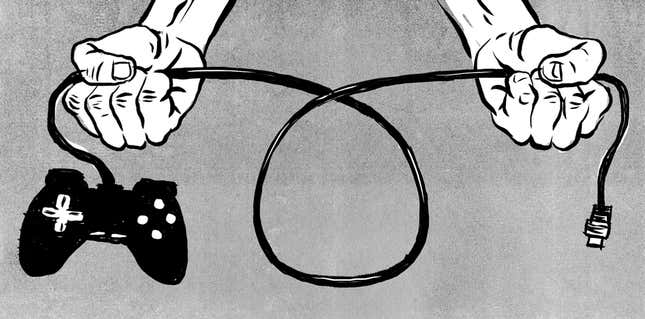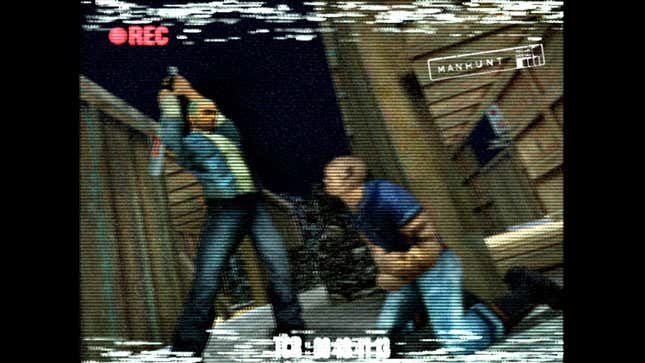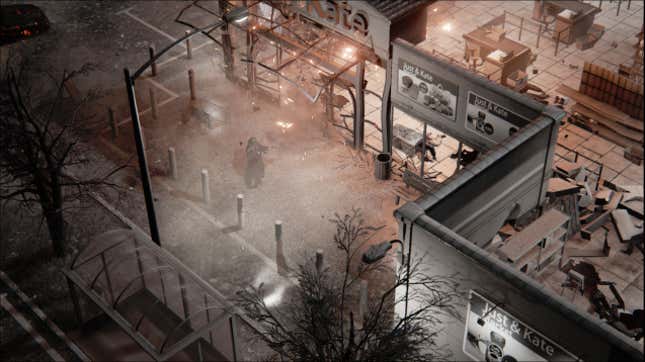
I like playing violent video games—the really violent ones, the ones that sometimes even disturb my fellow gamers. Why? It's complicated, but they make me feel better.
I'm talking about games like Manhunt, which allows you slowly suffocate someone with a plastic bag as they cry and gasp for air, or the yet-to-be-released Hatred, the controversial upcoming game that starkly appears to emulate real-life mass-shootings and that I want to play.
Even the worst things have their utility. As critical as much of the conversation surrounding games such as Hatred has been, it still has value. It pains me to see others discounting it out of hand. A game like that can be helpful for a person like me.
I'm at a stage in my life where I hate violence in just about any form. I find it deeply unnerving and uncomfortable. I squirm at the thought of thinking of someone—anyone—suffering. When I imagine a murder, all I can think about is the victim's last thoughts. Were they terrified? Had they made peace with their inevitable end? Quickly, and dramatically erased. Lost forever. The thought fills me with dread. I'll shiver and shrivel and cry if I dwell on pain and suffering just a bit too long. This is a defense mechanism for me. Some may think that response makes me weak, but it reminds me that I can feel compassion.

When I was younger—much younger—I hurt a lot of people. When I was three years old, I took a toy truck from a child and beat him over the head with it. Sometime later, I remember holding down a classmate whom I thought was "fucking retarded" and repeatedly kicked him in the testicles. On a few occasions I drew pictures of specific people I hated and used them as "practice." Countless schools and daycare centers expelled me, as I became a consistent "problem child." I'd pick fights and come to enjoy lashing out and hurting others. I was always looking for an excuse to go off. Until, one day, I did.
I grew up in a neighborhood so fraught with drug addiction and gang violence. Before I turned ten years old, I had been stabbed in the leg. People had shot guns in my general direction several times, once while I was in a church van.
I saw the world as hostile. I thought that it hated me and wanted me to die.
One afternoon, while on the school bus, a classmate insulted my mom. To this day, I can't remember what exactly he said… but it set me off. I grabbed him, slammed him on the ground, and hit him as hard as I could as many times as I could. After that, he couldn't mount much of a defense. Still seething with rage, I pulled out a small knife I'd stolen from my mom's boyfriend and moved to stab his chest. I saw his eyes widen as he filled with panic. I tried to bring the knife down, but several kids grabbed my arm.
But what if they hadn't? What if I killed him? How many more people might I have pushed into doing the same? I can only imagine the despair his parents might have felt or how traumatized all of the students on that bus may have been. I was seconds away from becoming just another "troubled" kid on the news. Looking back on it now, it frightens me and reminds me that just about anyone, when faced with the wrong circumstances, can be violent. A quick look at just about any of the psych studies from the days before ethics committees can confirm that. What's important to me is that there is a way to come back from that.
After many years of counseling, I've all but shed my violent past. My therapists, forward-thinking as they were, taught me that I shouldn't ever lose sight of what I was. They said I needed to come to terms with it and address it; I chose video games as a safe way to confront myself.
I was lucky, because someone saw that whatever awful things I might have done, I wasn't yet lost. But there's always the fear that I've just put on a façade to make my way through society. I'm terrified that, if I were to peel everything away, I'd find a monstrous person.

I haven't harmed someone in more than a decade, and I think part of that is because I seek out violence in the media I consume. Everything from Manhunt to the latest trailer for Hatred remind me that sometimes people do terrible things. When I play the most violent of games, I aim for sadism. I kill anyone and everyone in the most horrific way possible. I don't find joy in this. I'm filled with self-loathing and anguish, repeatedly coming back to who I was and struggling with the realization that, while I may not have killed anyone, I did a lot more damage than I can ever hope to atone.
In the pained, panicked faces of these game's fictitious victims, I find my own humanity. Knowing the cost of cruelty helps me internalize the abuse I've caused. The fact that it's all fake never really crosses my mind. The screams are real enough that it triggers disgust all the same.
Games in particular give me a safe place to open myself up to the worst of people—of myself—so I can continue to commit to being a better person, without ever forgetting the wake of destruction I left behind me. When I play an extremely violent game, I can access that darkest part of myself. I can step just a bit closer to the brutality. Grand Theft Auto and Call of Duty aren't enough. While they're violent-ish, it's not tangible enough for me to be effective. When I cross into the realm of games that let you hear the agonized wails of people that I am torturing, it reaches a different level. I can't laugh it off in the same way that I can when I run over a pedestrian in GTA. It becomes real for me. It torments me.
I can rarely finish these games. Condemned: Criminal Origins, a game that lets you mercilessly beat insane bums to death with lead pipes, was the only hyper-violent game I ever played to completion. And even then it was in short bursts over five years. Every few months, I'd settle in, shut out all distractions, wait until late at night and push further. I'd play until I was nauseated, before putting the game—and my past—in a box, not to be opened for another few months. I worry, sometimes, that the reason Condemned is the one I finished is because its bloodshed can be easy to rationalize: it's got more thematic ties to survival horror than Manhunt's wanton destruction. Instead of preying on others, you're merely trying to endure in a ghastly world. In that sense, unnerving though it may be, I was able to stick with it a bit longer than the others.
There was a time in my life when I knew what it was to live without remorse. I destroyed and hurt everything and everyone I could just to extract what I thought was justified revenge on a world that I saw as openly hostile towards me. Games such as Hatred have the potential to remind me of who I was and prove that the progress I've made is real. It proves that I still feel something. I have empathy. I can prove it. And I choose not to hurt.
Daniel Starkey is a freelance game critic currently based in Minneapolis. His work can be found at GameSpot, Eurogamer, and US Gamer. He has a Majora's Mask tattoo on the back of his neck, because let's face it, no game will ever be better.
Illustration by Jim Cooke

